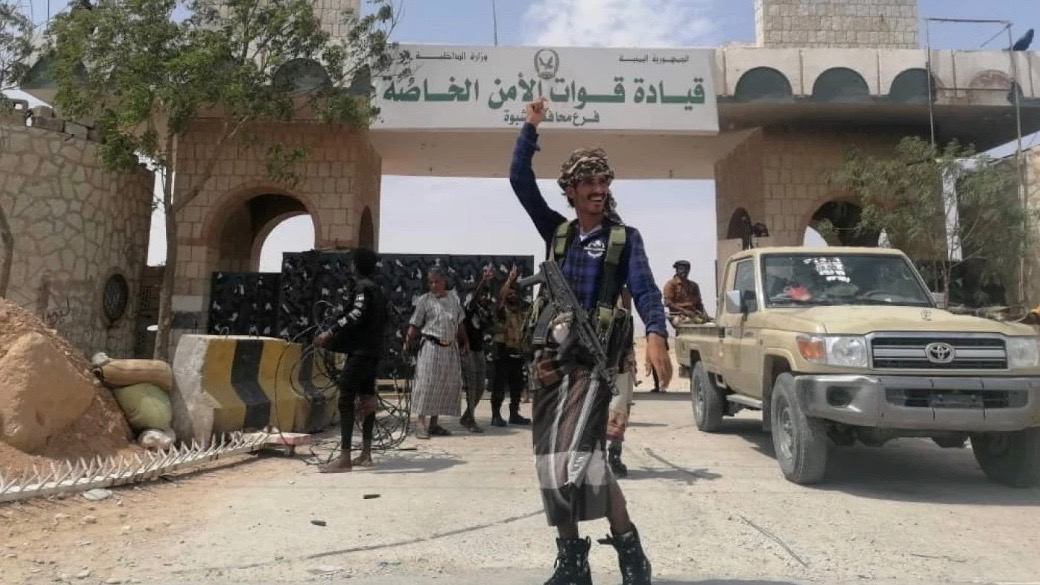Control over the oil-rich southeastern province has been a central issue among the warring factions in Yemen. The Houthis claim that Saudi-backed groups are working with imperialist forces to loot the country’s resources

UAE-backed forces celebrate after seizing control of an entrance to Ataq in Shabwah province on August 10. (Photo: via Middle East Eye)
Intense fighting has been going on for the last three days between forces affiliated to the Islah party and those loyal to other factions of the Saudi Arabia-led coalition in the oil-rich Shabwah province in southeastern Yemen. At least 35 people have been killed and scores of others injured in the fight so far.
As per the reports in Xinhua, the fighting broke out immediately after the dismissal of an official affiliated to the Islah party on Monday, and continued despite the Saudi-backed Presidential Leadership Council (PLC) based in Aden issuing a statement in support of the decision.
Rashad al-Alimi, president of the PLC, backed Shabwah Governor Awsad al-Awlaqi’s decision to dismiss the Islah official. The PLC later announced the removal of more officials considered to be affiliated to the Islah party and involved in the fight.
The Southern Transitional Council (STC), a significant faction in the Saudi-backed coalition, issued a statement on Wednesday supporting Al-Awlaqi’s decision. STC’s forces are considered to be participating in the fight against Islah.
The STC has been working for a separate South Yemen for a long time and has in the past fought against other Saudi-backed forces in Aden. It has an old rivalry with Islah, which is considered to be affiliated to the Muslim Brotherhood and represents the country’s traditional ruling classes. The rivalry was fueled further after the war in the country broke out in 2015, due to the UAE’s backing. The ruling class in the UAE has led an international campaign against the Muslim Brotherhood.
Looting of Yemeni resources
The oil-rich Shabwah province has been a center of the war in Yemen during the last seven years. Earlier this year, there was a fight for control over the province between the Houthis and the Saudi-backed coalition, in which the coalition was able to retain its control. The Houthis claim that coalition forces are helping Saudi Arabia and the US to loot the country’s resources and deprive Yemenis of a crucial source of economic sustenance.
Mahdi al-Mashat, head of the Houthi-backed government in Sanaa, has repeatedly pointed out the continued looting of Yemen’s resources by forces backed by Saudi Arabia and the US, and demanded that the issue be a part of the ceasefire negotiations.
“We denounce the [Saudi backed] mercenaries for plundering the Yemeni people’s national assets and depositing the proceeds in a Saudi National Bank (SNB) account,” Mashat said on Wednesday, reported Iranian Press Tv. He demanded that the money earned from Yemen’s resources should be used to pay the salaries of government employees and pensioners.
Violations of ceasefire deal
Meanwhile, the UN-brokered ceasefire, which was extended at the last moment for another two months, continues to face new challenges. On Wednesday, the Yemeni Petroleum Company claimed that Saudi-backed forces have seized yet another fuel ship headed to the Hodeidah port. It termed this a blatant violation of the ceasefire agreement, Press tv reported.
The Saudi-led international coalition has imposed a comprehensive land, air and sea blockade of Yemen since 2015, depriving Yemenis of crucial life saving items such as medicines, food and fuel. The blockade was considered to be the central cause of the large-scale starvation and health emergencies in Yemen, leading to the deaths of hundreds of thousands of people.
As per the terms of ceasefire which first came to effect in the beginning of April this year, Saudi Arabia agreed to allow limited movement of flights from Sanaa airport and ships to the Hodeidah port. However, the Houthi-backed administration has often complained of non-implementation of the agreement and repeated seizure of fuel ships by the Saudis.